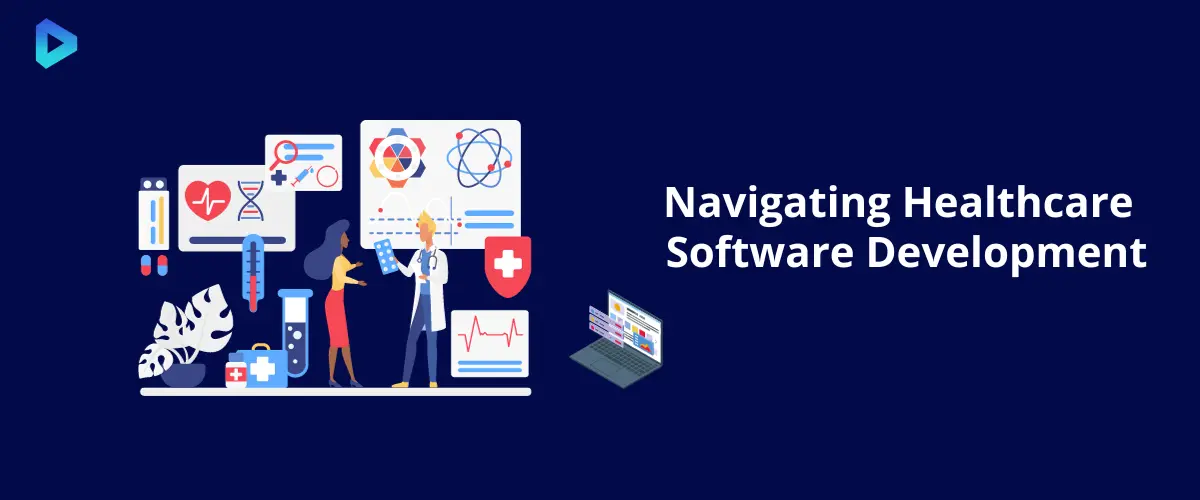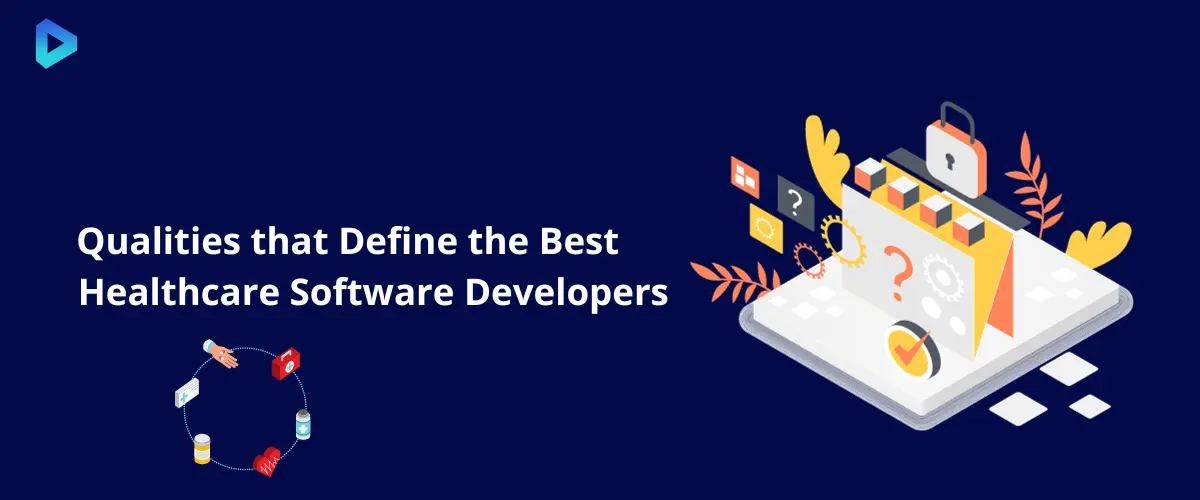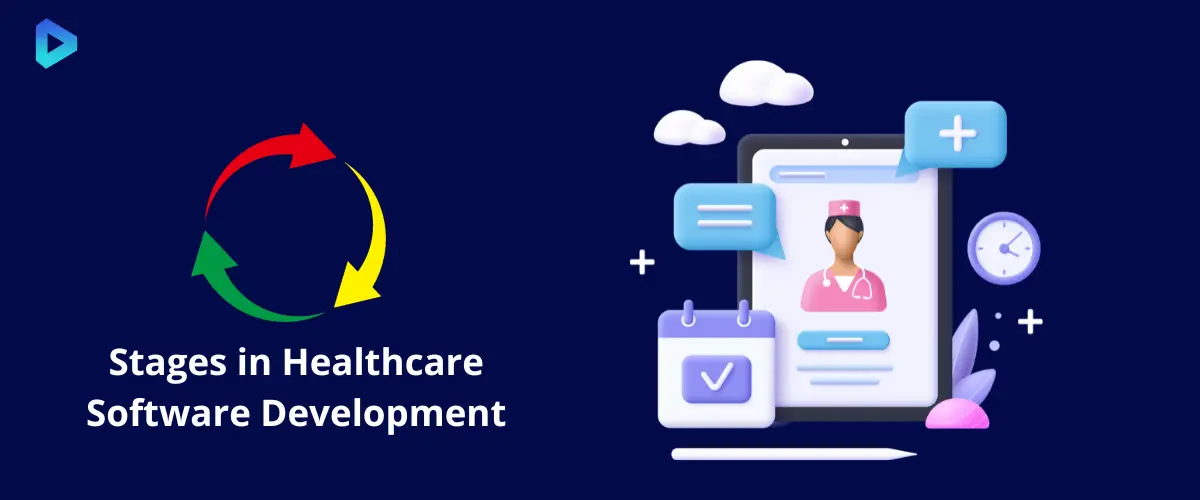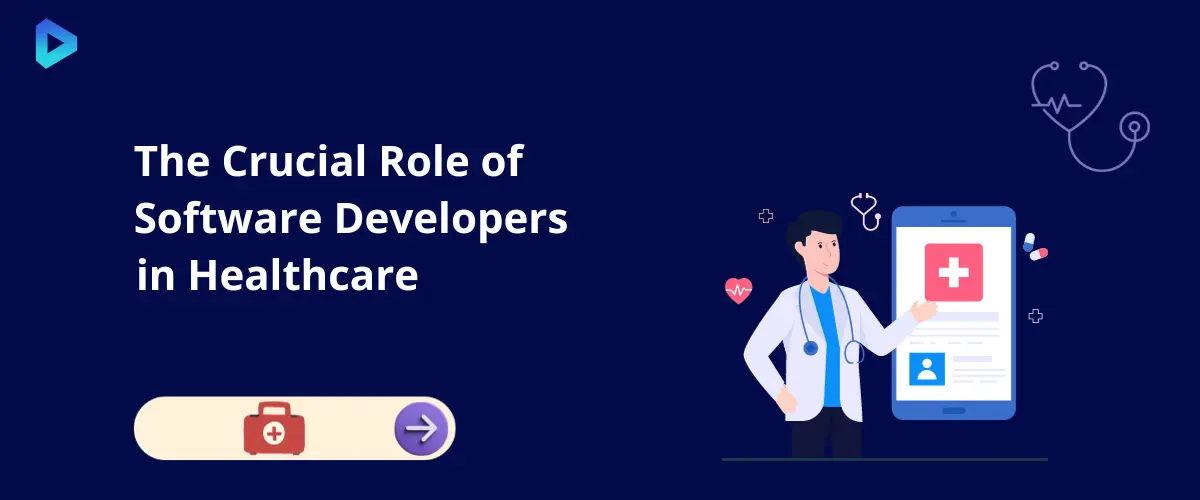The healthcare industry is undergoing a profound transformation. At the heart of this revolution are healthcare software developers. They play a critical role in shaping the future of healthcare. These unsung heroes are the architects of innovation, creating the digital solutions that power modern healthcare.
The World of Healthcare Software Development
 Understanding Healthcare Software Developers
Understanding Healthcare Software Developers
The Impact of Healthcare Software
Challenges in Healthcare Software Development
Qualities of Top Healthcare Software Developer

Technical Proficiency
Technical proficiency stands as one of the cornerstones that distinguish top-tier healthcare software developers. To excel in this field, these professionals must possess a comprehensive set of technical skills and knowledge that go beyond generic software development. They need to be masters of programming languages such as Java, Python, C++, and others. Additionally, they should have a deep understanding of software development methodologies and system architecture. Given the critical nature of healthcare data, they must also be well-versed in database management. This ensures they can design, develop, and maintain systems capable of managing and processing large volumes of sensitive patient information.
Beyond generic technical skills, top healthcare software developers must exhibit profound expertise in healthcare-related technologies. Understanding industry-specific standards like HL7 (Health Level Seven) is essential for ensuring seamless integration with existing healthcare infrastructure and governing healthcare data exchange. Similarly, a deep understanding of ICD-10 (International Classification of Diseases, 10th Edition) coding is critical for proper diagnosis and billing. Knowledge of DICOM (Digital Imaging and Communications in Medicine) standards is essential for handling medical imaging data. Expertise in these healthcare-specific technologies is not only a badge of honor but also a necessity. It is essential for building systems that navigate the complexities of the healthcare environment, ensuring the compatibility and accuracy of patient data.
Adaptability and Compliance
Adaptability and compliance represent two pivotal qualities that distinguish top-tier healthcare software developers. The healthcare industry is renowned for its dynamic nature, characterized by an incessant evolution of regulations, standards, and technologies. Thus, healthcare software developers must display remarkable adaptability to navigate these constant shifts effectively. They need to stay ahead of the curve, swiftly including new requirements and technologies in their software solutions. This ensures that healthcare providers can seamlessly adapt to changing regulatory landscapes without disruption to their operations.
A prime illustration of the significance of compliance lies in the Health Insurance Portability and Accountability Act (HIPAA). HIPAA imposes intricate regulations concerning the privacy and security of patient data, making it a cornerstone of healthcare software development. Top healthcare software developers must be well-versed in the intricate details of HIPAA. Additionally, they need the technical know-how to embed the necessary safeguards and protocols directly into their software. This is essential for ensuring the highest standards of data security and patient privacy, which are non-negotiable in the healthcare domain. Compliance with healthcare standards goes beyond a legal obligation; it is a fundamental requirement. It is necessary for earning the trust and confidence of both healthcare providers and patients.
Collaboration and Communication
Collaboration and effective communication are essential qualities that distinguish top-tier healthcare software developers. The healthcare industry operates as a complex ecosystem where diverse teams, including healthcare professionals, administrators, and IT specialists, must seamlessly work together. Healthcare software developers play a pivotal role in this multiple-field landscape, and their ability to foster collaboration and communicate effectively is paramount. To succeed in healthcare software development, these professionals must actively engage with healthcare stakeholders. This is to comprehend the unique requirements, challenges, and goals of a project. They serve as the vital link between the world of technology and the intricacies of healthcare. This involves translating complex technical concepts into language that non-technical team members can readily understand.
One of the prime examples of effective multiple-field teamwork in healthcare projects is the collaboration between healthcare software developers and clinical experts. When designing electronic health records (EHR) systems, developers collaborate closely with healthcare professionals to create intuitive and efficient user interfaces. These interfaces allow healthcare providers to easily access and update patient data, which is crucial for timely and accurate patient care. Such collaborations require a deep understanding of clinical workflows. They also require the ability to communicate with healthcare professionals compassionately. This ensures the software aligns with their daily practices and enhances their productivity.
Healthcare Software Development Life Cycle

Requirements Gathering and Analysis
The initial stage of the healthcare software development life cycle is the pivotal process of requirement gathering and analysis. In this phase, software developers work closely with healthcare institutions to thoroughly understand their specific needs, challenges, and goals. Unlike generic software development, developers must carefully tailor healthcare software to meet the intricate demands of the healthcare industry. This entails understanding the unique workflows, clinical processes, and regulatory requirements of healthcare providers, as well as the administrative intricacies of healthcare institutions. We cannot overstate the importance of this stage. A deep understanding of healthcare-specific requirements is the foundation for developing effective and efficient software solutions. By gathering and analyzing these requirements, developers ensure that the resulting software aligns with the clinical and working intricacies of healthcare. This, in turn, enhances patient care, improves efficiency, and maintains regulatory compliance. The success of healthcare software development depends on this phase. It allows developers to create solutions that directly meet the unique needs of healthcare institutions and professionals.
Design and Development
The design and development phase of healthcare software is critical. It's where the idea of software development begins to take shape. This stage comprises several key phases, starting with those related to design and database modeling. Software architects and developers collaborate to create a robust software architecture that can efficiently handle healthcare data and provide the required functionalities. Following this, the user interface (UI) and user experience (UX) design are crucial. In healthcare software, creating user-friendly interfaces is crucial because it directly affects the efficiency of healthcare professionals. The design should be intuitive, ensuring that healthcare providers can quickly access patient data, input information, and navigate the system. It should also prioritize data visualization for a clear and concise presentation of medical information. Development follows design, where the actual coding and programming take place. Best practices for creating efficient healthcare software include adhering to industry-specific standards. This involves optimizing data processing for speed and accuracy and ensuring data security and privacy compliance. Thorough testing and quality assurance are vital to identify and resolve any issues before implementation. Ultimately, in this phase, developers transform healthcare software from a concept into a practical, user-friendly, and efficient solution that meets the complex needs of the healthcare industry.
Testing and Quality Assurance
Rigorous testing and quality assurance (QA) represent a pivotal stage in healthcare software development, ensuring the reliability and security of healthcare applications. The healthcare sector requires software solutions that operate flawlessly. Any errors or weaknesses can have severe consequences for patient care and data security. Testing involves a comprehensive evaluation of the software. This includes functional testing to verify that the software performs as intended. It also involves non-functional testing to assess performance, security, and compliance. Healthcare software undergoes extensive validation, including testing for data accuracy, adherence to healthcare standards like HIPAA, and compatibility with other healthcare systems. QA processes involve thorough code reviews, continuous integration testing, and security assessments to identify and rectify any weaknesses that may compromise data privacy. Given the sensitivity of healthcare data, QA procedures ensure that healthcare software meets the highest standards of security, reliability, and performance, ultimately safeguarding patient information and enhancing the quality of care.
Prominent Healthcare Software Developers
One of the leading healthcare software development companies is DigiPrima. Industry experts and clients recognize DigiPrima for its cutting-edge solutions and its stellar track record in creating innovative healthcare software. The company actively participates in numerous projects aimed at improving patient care, working efficiency, and healthcare innovation. Their portfolio includes the development of electronic health record (EHR) systems, telemedicine platforms, and diagnostic tools. These solutions have streamlined healthcare processes and improved patient outcomes. Client reviews and testimonials frequently emphasize DigiPrima's commitment to understanding the unique needs of healthcare institutions. They also highlight the company's ability to create tailored software solutions that make a meaningful impact. Clients consistently praise the company's dedication to data security and regulatory compliance, including adherence to HIPAA standards. This reflects their unwavering commitment to safeguarding patient information. With a strong reputation for excellence and a portfolio of successful healthcare software projects, DigiPrima stands out as a prominent player in the healthcare software development sector.
HealthTech Solutions
HealthTech Solutions is a renowned healthcare software development company known for its exceptional offerings in healthcare technology. When comparing HealthTech Solutions with DigiPrima, it becomes evident that both companies excel in providing innovative solutions for the healthcare sector. HealthTech Solutions primarily specializes in developing electronic health record (EHR) systems, practice management software, and healthcare analytics solutions. User reviews consistently praise their user-friendly interfaces, which simplify data entry and retrieval for healthcare providers, contributing to enhanced working efficiency. Customers and industry experts recognize HealthTech Solutions for its competitive pricing models, while both companies prioritize data security and compliance. This makes their solutions accessible to a wide range of healthcare providers, including small clinics and large hospital systems. The combination of cost-effectiveness, a strong industry presence, and recognition has established HealthTech Solutions as a trusted partner in healthcare software development. They cater to the diverse needs of healthcare institutions across the board.
Conclusion
 In conclusion, healthcare software developers play a pivotal role in the ongoing revolution of the healthcare industry. Their contributions are transformative, reaching across the domains of patient care, working efficiency, and medical progress. These unsung heroes are the architects of innovation, creating the digital solutions that power modern healthcare. Their work enhances patient care by providing quick and secure access to vital information, enabling accurate diagnoses and streamlined treatment decisions. Moreover, healthcare software optimizes working efficiency, reducing administrative burdens and allowing healthcare professionals to focus more on patient care. It fosters medical progress through groundbreaking solutions like AI-driven diagnostics and precision medicine platforms. Collaboration between healthcare professionals and software developers is essential for shaping the future of healthcare, ensuring that it remains patient-centered, efficient, and innovative. Healthcare software developers play a crucial role in bridging technology and healthcare, working towards a healthier future for all.
In conclusion, healthcare software developers play a pivotal role in the ongoing revolution of the healthcare industry. Their contributions are transformative, reaching across the domains of patient care, working efficiency, and medical progress. These unsung heroes are the architects of innovation, creating the digital solutions that power modern healthcare. Their work enhances patient care by providing quick and secure access to vital information, enabling accurate diagnoses and streamlined treatment decisions. Moreover, healthcare software optimizes working efficiency, reducing administrative burdens and allowing healthcare professionals to focus more on patient care. It fosters medical progress through groundbreaking solutions like AI-driven diagnostics and precision medicine platforms. Collaboration between healthcare professionals and software developers is essential for shaping the future of healthcare, ensuring that it remains patient-centered, efficient, and innovative. Healthcare software developers play a crucial role in bridging technology and healthcare, working towards a healthier future for all.




Leave your thought
Send us a Message
Contact Info
[email protected]
[email protected]
+91-62661-63663
[email protected]